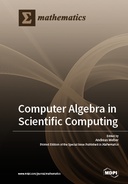Explore

Computer Algebra in Scientific Computing
Andreas Weber
2019
0 Ungluers have
Faved this Work
Login to Fave
Although scientific computing is very often associated with numeric computations, the use of computer algebra methods in scientific computing has obtained considerable attention in the last two decades. Computer algebra methods are especially suitable for parametric analysis of the key properties of systems arising in scientific computing. The expression-based computational answers generally provided by these methods are very appealing as they directly relate properties to parameters and speed up testing and tuning of mathematical models through all their possible behaviors. This book contains 8 original research articles dealing with a broad range of topics, ranging from algorithms, data structures, and implementation techniques for high-performance sparse multivariate polynomial arithmetic over the integers and rational numbers over methods for certifying the isolated zeros of polynomial systems to computer algebra problems in quantum computing.
This book is included in DOAB.
Why read this book? Have your say.
You must be logged in to comment.
Rights Information
Are you the author or publisher of this work? If so, you can claim it as yours by registering as an Unglue.it rights holder.Downloads
This work has been downloaded 104 times via unglue.it ebook links.
- 50 - pdf (CC BY-NC-ND) at Unglue.it.
Keywords
- combinatorial decompositions
- computational algebra
- Computer science
- Computing & information technology
- Degree
- Dini-type helicoidal hypersurface
- element order
- entanglement
- four-dimensional space
- free resolutions
- Galois fields
- Galois rings
- Gauss map
- Henneberg-type minimal surface
- implicit equation
- integrability
- interval methods
- invariant surfaces
- isolated zeros
- Linearity
- Lotka–Volterra system
- minimum point
- Minkowski 4-space
- mutually unbiased bases
- normal form
- number of elements of the same order
- over-determined polynomial system
- polynomial arithmetic
- polynomial modules
- projective special linear group
- projective special unitary group
- pseudo-division
- pseudo-remainder
- simple Kn-group
- sparse data structures
- sparse polynomials
- SU(2)
- sum of squares
- superposition
- thema EDItEUR::U Computing and Information Technology::UY Computer science
- timelike axis
- Weierstrass representation
Links
DOI: 10.3390/books978-3-03921-731-1Editions


